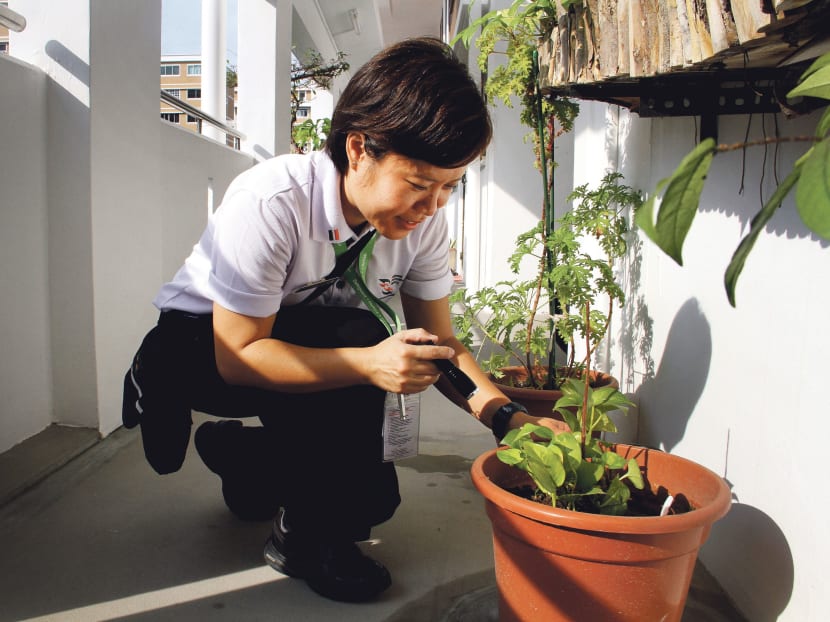Low herd immunity ‘allows dengue to persist in Singapore’
SINGAPORE — Though the Republic has done a good job in controlling the mosquito population, the dengue problem persists due to the low herd immunity of the community and the transmission of the disease across the region, said an epidemiologist yesterday.

An NEA officer searching for mosquito breeding. Professor Duane Gubler said Singapore needs to increase its herd immunity through vaccines. TODAY FILE PHOTO
SINGAPORE — Though the Republic has done a good job in controlling the mosquito population, the dengue problem persists due to the low herd immunity of the community and the transmission of the disease across the region, said an epidemiologist yesterday.
Professor Duane Gubler, founding director of the Emerging Infectious Diseases Programme at Duke-NUS Graduate Medical School, noted that since 1968, Singapore has managed to keep its mosquito population low.
“The problem … (is) the low herd immunity, the low seroprevalence in the population and the tremendous amount of epidemic dengue that occurs in surrounding countries,” he told reporters on the sidelines of the opening ceremony of the fourth Asia-Pacific Dengue Workshop yesterday.
Jointly organised by the World Health Organization (WHO), the Ministry of Foreign Affairs and the National Environment Agency (NEA), the workshop will focus on strengthening laboratory capacity, surveillance, clinical management and vector control issues to avert or lessen the impact of dengue outbreaks.
During his keynote address, Prof Gubler also listed urban growth in tropical developing countries, a lack of effective mosquito control in these cities and globalisation as major drivers of the dengue pandemic today.
While he noted that Singapore has good mosquito control programmes in place, he said the country needed to increase its herd immunity — the population’s overall immunity level — through vaccines.
New vector control methods, such as Wolbachia, can also be adopted. The method involves using male Aedes aegypti mosquitoes infected with Wolbachia, a naturally-occurring bacteria, to suppress the dengue-virus-carrying mosquito population.
“When we reach that balance when the herd immunity comes up and the mosquito population goes down — you stop (dengue) transmission,” said Prof Gubler, who also leads the Dengue Expert Advisory Panel to see if the Wolbachia technology is safe here.
He noted that while the vaccine being developed by French pharmaceutical giant Sanofi Pasteur had received “bad press” for its low efficacy rate of 56 per cent, it remains useful in suppressing the transmission of dengue.
Earlier this month, Environment and Water Resources Minister Vivian Balakrishnan said in Parliament that the vaccine was not as effective against Serotype 1, the dominant strain of dengue here, as it was against Serotypes 3 and 4.
Prof Gubler said: “(If) you give (a population) a vaccine that protects against two or three viruses, what you’ve done is you’ve increased that herd immunity and broadened the immune response to the point where you’re going to depress transmission.”
Dengue cases here fell slightly to 424 cases last week, but Singapore remains in the peak dengue season, said the NEA. As of Monday, 13 areas — including Choa Chu Kang and Circuit Road — have been classified as high-risk areas, with 10 or more dengue cases.
Another expert, Dr Raman Velayudhan, coordinator of the Vector Ecology and Management unit of the WHO, raised the issue of estimating the “true burden of dengue” to better identify the extent of infections worldwide. He told reporters that dengue could present itself in a simple flu-like illness or in a more severe form that requires hospitalisation. The issue then lies with those who had the flu-like illness but were not detected to have dengue, said Dr Raman.
Knowing the true burden of dengue could help in determining how to allocate limited resources to control the disease and assess the impact of efforts to tackle dengue, he said.






